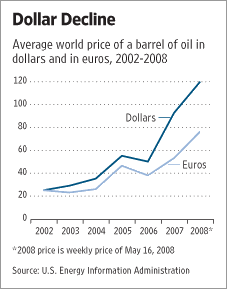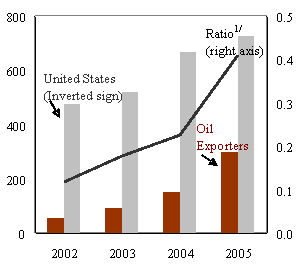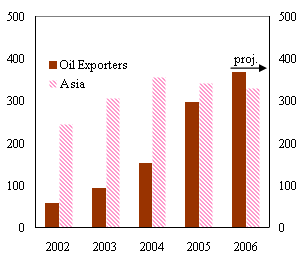- "Oil prices had their biggest gains ever on Friday, jumping nearly $11 to a new record above $138 a barrel, after a senior Israeli politician raised the specter of an attack on Iran and the dollar fell sharply against the euro" (Jad Mouawad, "Oil Prices Skyrocket, Taking Biggest Jump Ever," New York Times, 7 June 2008).
- "Oil prices surged almost 8 percent, to $138.54 a barrel after a senior Israeli politician raised the specter of an attack on Iran and the dollar fell against the euro. 'As soon as that news hit the tape, oil spiked about $6,' said David Kovacs, an investment strategist at Turner Investment Partners" (Abha Bhattarai, "Dow Slides Nearly 400 Points; Oil Surges," New York Times, 7 June 2008).
If the Americans were smarter, they would be demanding that, instead of backing Israel no matter what, the USG withdraw troops from Iraq and Afghanistan (which the Iranians, the Syrians, the Turks, the Pakistanis, the Indians, the Russians, and other interested parties in the region can collaboratively manage on behalf of the world) and invest the money saved ($165 billion from now through June 2009) into oil field development to cover the estimated investment shortfall ($95 billion, according to Platts). Technology to raise oil production exists -- what's lacking is the political will to transfer it, as well as money, into the right hands (i.e., the hands of those who own most existing and potential oil reserves, the national oil companies of the global South).
Meanwhile, "the unemployment rate [in the United States] in May had its highest monthly increase in 22 years" (Bhattarai, 7 June 2008). Will the Fed stick to its promise not to cut rates again any time soon and to defend the dollar? Cut the rates to revive economy,1 and the Fed will stoke inflation and risk imperiling the dollar's status as the world's reserve currency2 (of which US Treasury Secretary Henry Paulson recently had to reassure the Gulf Arab ruling class3); raise the rates to attack inflation and restore confidence in the dollar, and the Fed will risk plunging economy into a depression.
1 More fundamentally, cutting the rates, i.e., treating the credit crisis as if it were a crisis of liquidity, doesn't touch the heart of the financial darkness: banks' inability to trust each other (cf. Joseph Halevi, "Los bancos centrales ya no tienen margen de maniobra. . . ," Sin Permiso, 30 December 2007). Hence the crisis continues: "Banking Group Won't Change Way Libor Measure Is Set" (Bloomberg News, 30 May 2008); Michael Mackenzie and Gillian Tett, "Libor Remarks Fail to Put Unease to Rest" (Financial Times, 2 June 2008); Tony Jackson, "Lack of Trust Lurks at the Heart of Banking Trouble" (Financial Times, 2 June 2008); Sean Farrell, "The Next Banking Crisis?" (Independent, 3 June 2008); "Why Interest Rates Are Higher than You Think" (Money Week, 5 June 2006).
2
 The European Central Bank has been more hawkish on inflation than the Federal Reserve. There is no coherent international policy on inflation and economic growth, even among the power elites of the US-led multinational empire, which makes it difficult for the Fed to perform its balancing act. Moreover, a great part of the recent oil price rises has been due to the dollar's weakness. Those oil producers, like the Gulf states, whose currencies are pegged to the dollar (but most of whose imports come from Europe), are thus forced to adopt a pro-cyclical policy against their interests. Bretton Woods II has ceased to make sense even on capitalist terms (to say nothing of the social costs to the South of accumulating dollar reserves and financing the US economy at the expense of domestic investment).
The European Central Bank has been more hawkish on inflation than the Federal Reserve. There is no coherent international policy on inflation and economic growth, even among the power elites of the US-led multinational empire, which makes it difficult for the Fed to perform its balancing act. Moreover, a great part of the recent oil price rises has been due to the dollar's weakness. Those oil producers, like the Gulf states, whose currencies are pegged to the dollar (but most of whose imports come from Europe), are thus forced to adopt a pro-cyclical policy against their interests. Bretton Woods II has ceased to make sense even on capitalist terms (to say nothing of the social costs to the South of accumulating dollar reserves and financing the US economy at the expense of domestic investment).3 See how crucial petrodollar recycling has become to plug the US current account deficit:
As a result of the recent rise in oil prices, oil exporters have become important counterparts to the United States in the ownership of foreign savings. Their current account surplus represented in 2005 some 40 percent of the U.S. current account deficit, nearly doubling in one year (Chart 2).Chart 2
Oil exporters are close to becoming more important than Asia in the holding of net savings outside the United States (Chart 3). While Asia's current account surplus is projected to have risen to US$341 billion in 2005 (equivalent to 47 percent of the United States' current account deficit), that of oil exporters is projected to have reached US$296 billion (equivalent to 41 percent of the United States' current account deficit). Relative positions are expected to reverse in 2006. According to IMF projections, oil exporters' current account surplus would amount to 46 percent of the U.S. deficit in 2006, while the figure for Asia would drop to 41 percent.
Current Account Positions
(in billions of US$)
1Ratio of current account of oil exporters to current account of the United States (in percent, right axis).Chart 3
(Saleh M. Nsouli, Director, Offices in Europe, International Monetary Fund, "Petrodollar Recycling and Global Imbalances," Presentation at the CESifo's International Spring Conference, Berlin, 23-24 March 2006)
Foreign Savings
(Current account surplus, US$ billion)






1 comment:
You are on reddit:
http://www.reddit.com/info/6mdnr/comments/
Post a Comment